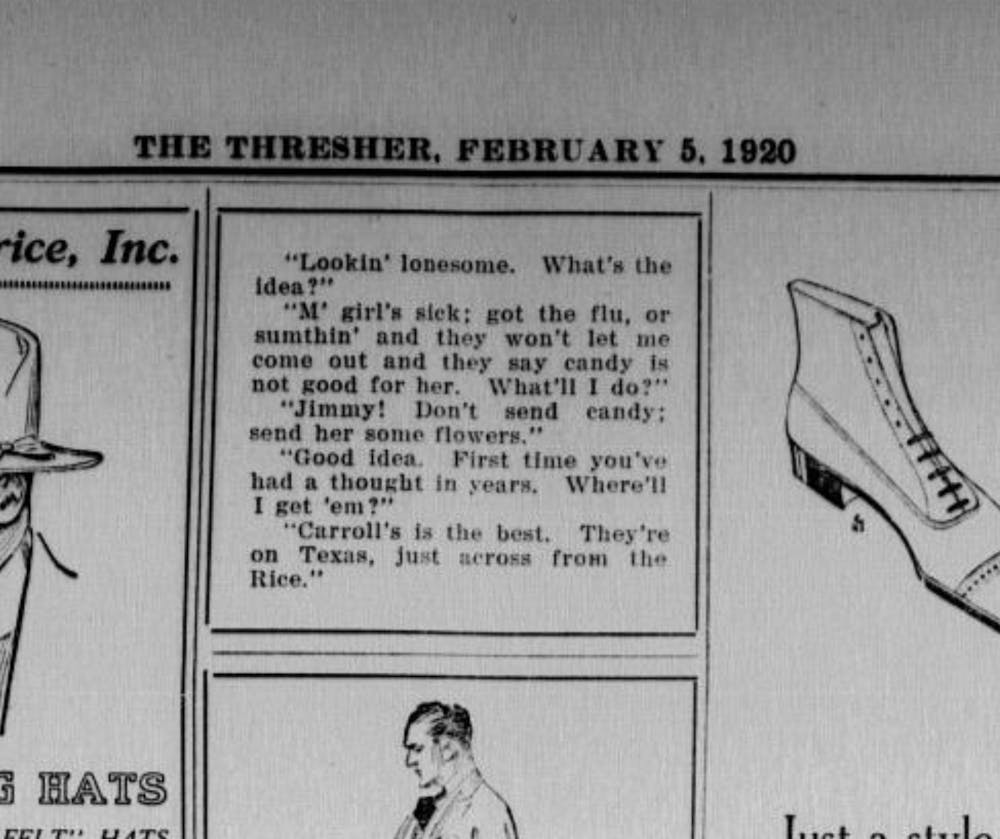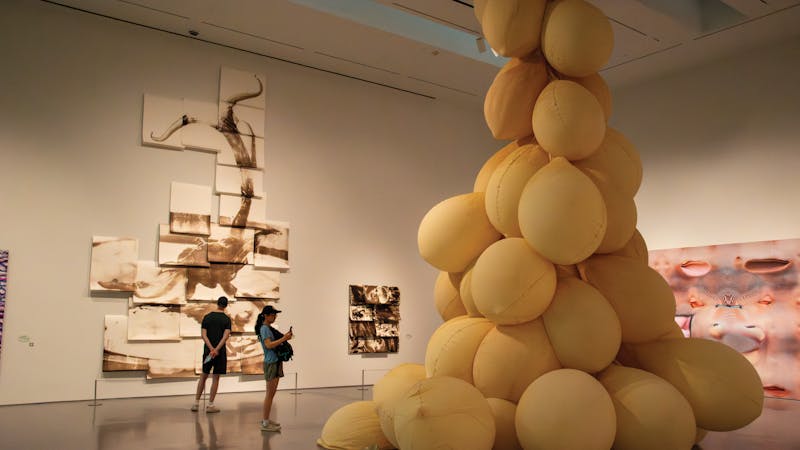‘Some call it Hell; I call it “Flue”’: A look back at the 1918 pandemic

In the history of the Rice Thresher, the publication of print editions has been suspended on just a handful of occasions: during a historic winter storm last February and the onset of the COVID-19 pandemic in the United States in spring 2020, for instance. Printing also stopped during World War I — and the coinciding Spanish influenza pandemic — in 1918. The last edition of the Thresher in 1918 was published May 25. Thresher staff wrote about the establishment of the Student Association and the poor quality of food during wartime and published advertisements, aimed at the student body of a militarized campus, for military uniforms for sale.
By the time the Spanish influenza ravaged Houston in the fall, killing 2,100 Houstonians by the end of October, the Thresher was not printing; as a result, firsthand accounts of the student experience are scarce.
A 2018 blog post written by former Rice historian and graduate student Melissa Kean explored what was the only firsthand student account of the influenza pandemic that she had found, written 57 years later in 1975.
“Credit should be given to the Institute’s staff and to the Army Medical Corps for the effective way in which the situation was handled,” E. Finley Carter (class of 1922) wrote. “With the onset of the epidemic one of the dormitories was converted to a hospital staffed with army doctors and nurses who cared for the many patients who were victims of influenza.”
Though Carter references a student dying early on, before the threat the influenza played was evident, he wrote that, as he recalled, there were no student fatalities regardless of the many deaths at “A&M and other institutions.” Despite the lack of fatalities, Carter wrote that he himself had a difficult time breathing to climb the stairs of Lovett Hall after he recovered from the worst of the influenza.
In an interview with the Rice Historical Review, Kean discussed some of the potential reasons why firsthand accounts from the Rice student body are lacking.
“In the firsthand account, we see that all the doctors and the nurses in the field hospital at Rice were military nurses and doctors because the entire campus was under military regulation as there was a war going on,” Kean said. “As the Spanish flu was tearing through Houston, we were in the middle of a world war and that had to take precedence over everything else, and we didn’t shut down.”
Kean also said that the pause on student publications, as well as the student body’s lower standards for personal safety, may have contributed to the lack of primary accounts.
Interspersed between advertisements for war savings stamps, military recruitment efforts and updates on the war, the Oct. 24, 1918 edition of the Houston Chronicle covered several aspects of the developing influenza pandemic. Rice University, known as the Rice Institute at the time, planned to play a practice football game that Saturday. The Chronicle wrote, “Influenza at Rice Institute has thrown the football squad for a loss, but the worst is over,” even as they reported that newspaper ads were being used to raise awareness for the public health crisis.
This same issue announced that the United States’ public health service sent doctors to Houston influenza or pneumonia patients who were unable to reach their own physicians. Drug stores advertised miracle cures for the Spanish influenza and its aftereffects. The Houston Chronicle’s editorial called for the Houston community to respect the order banning public gatherings — an order that only lasted a few weeks.
However, while formal accounts from Rice students of the influenza pandemic in 1918 are non-existent, the threat of the disease did not evaporate at the start of the following year. The Spanish influenza was still considered a threat into 1920, although deaths had slowed throughout 1919. In the Thresher, references to the influenza that was unusually deadly in young adults similarly continued.
In the March 23, 1919 issue, a poem focusing on the symptoms of influenza was published under the name “Casey.” The poem focuses on the experience of someone who was presumably a student.
“Sometimes, maybe, you get well,” Casey wrote after describing the symptoms. “Some call it ‘Flue,’ I call it Hell!”
In the same issue, the Thresher reported on a comment that Mr. Caldwell, the History 300 instructor, made about the impact of the influenza on the young Rice Institute.
“We got about a half century behind during the influenza pandemic,” Caldwell said.
On May 1, 1919, the Thresher reported on the death of Ira South, the “first Rice boy to apply to the committee for withdrawal from school” and “the first Institute boy in the service.”. He was known as a literary scholar and had several poems published before his death from influenza.
“[T]he Saturday Evening Post accepted a short woodsy sketch entitled ‘Gone.’ Before the publication of this little poem … [he] was stricken with the influenza epidemic and was ‘Gone’ from his many friends,” the Thresher wrote. “Ira South died of pneumonia in the naval hospital at Portsmouth, October 11, 1918.”
The Thresher of 1919 may not have had a satirical Backpage cracking jokes about COVID-19 tests, but it had sections of jokes submitted by students, some of them darkly tackling the ongoing pandemic. In a joke from the May 22, 1919 issue, St. Peter asks a young woman how she got to Heaven, and she replies, “I ‘Flue.’”
Several other jokes published by the Thresher referenced the pandemic. A poem published Oct. 23, 1919 pokes fun at doctors preemptively diagnosing people with the flu. In 1920, a writer poked fun at a couple being confined to bed together from the “influenza” and at an outbreak at A&M.
In the Jan. 22, 1920 Thresher, a Rice faculty member’s wartime activities as the National Secretary for the Red Cross are recounted, and a postponed trip due to him becoming ill with influenza is mentioned. The Feb. 5, 1920 issue ran an advertisement that encouraged a young man to buy flowers for his “girl” who was isolated with influenza. On Feb. 27, 1920, the Thresher reported that Texas University, now UT Austin, awarded a new insignia, the “Flu T,” to 77 women at the university who followed influenza protocols.
Specific incidences of students catching influenza continue to be referenced in 1923 although Thresher coverage of influenza died down. The Spanish influenza’s impact was exacerbated by the World War that the Rice Institute played a role in as well.
In the 1920 senior edition of the Thresher, recognition was given to three members of the class of 1920 who would not be graduating because they had died. Two men died in combat and another from influenza.
“Joseph Weldon Haycock, a victim of influenza while a member of the Training Corps, made a no less sacrifice than his two heroic classmates,” the Thresher wrote.
Firsthand accounts of this period are sparse, but we can form an idea of the student experience through jokes and tributes to fellow classmates. Maybe, in a century from now, Thresher writers will be uncovering our old articles, reading the Backpage and piecing together what it was like to be a Rice student during the COVID-19 pandemic.
[10/6/2021 5:15 pm This article has been updated to reflect that printing of the Thresher has been suspended more than three times.]
More from The Rice Thresher

Rice loses to UH in Bayou Bucket Classic
The Bayou Bucket will remain with the University of Houston until at least 2030 after Rice football lost to the Cougars Saturday.

Moody Center’s new exhibit blurs the line between body and machine
Swelling latex sculptures, inspired by placentas and umbilical cords have taken up residence in the Moody Center for the Arts. The Barcelona-based artist Eva Fàbregas describes her pieces as forms that grow from “the guts of the architecture,” inflating and wrinkling as if they were alive.

Fizz users and moderators talk fame, challenges
During the volleyball team’s face-off against the University of Texas at Austin on Sept. 3, Jack Vu decided to have a little fun with the scoreboard. An anonymous poster had inaccurately mentioned that Rice beat UT on Fizz, so Vu decided to join in.

Please note All comments are eligible for publication by The Rice Thresher.